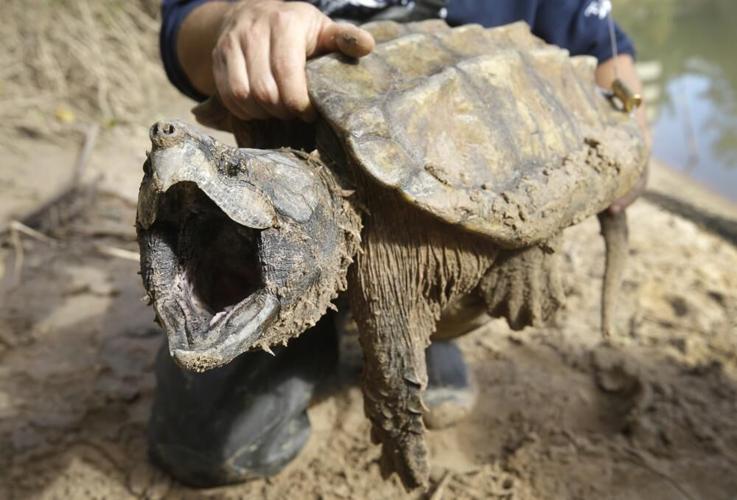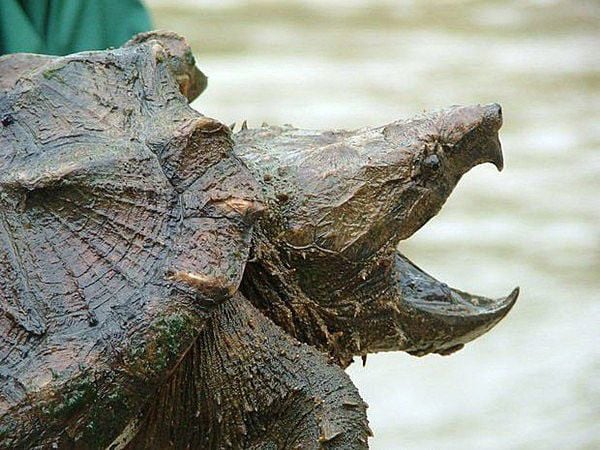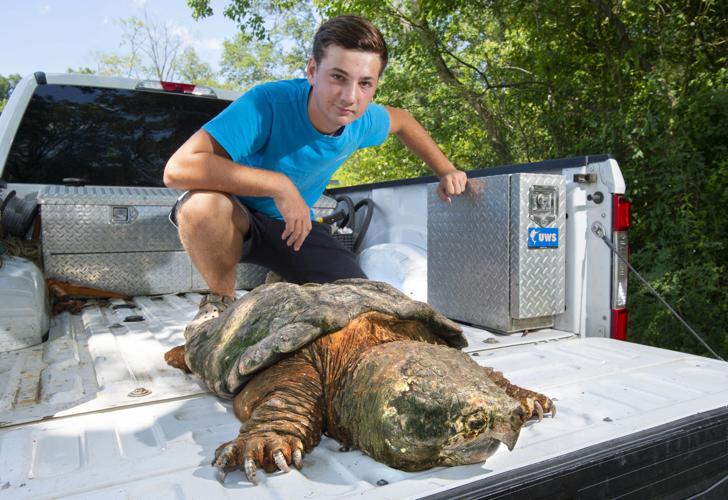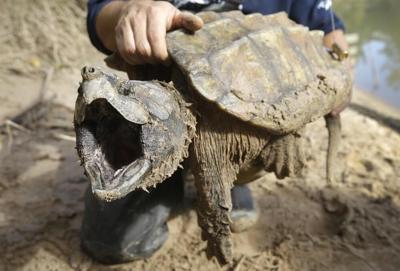Despite its burly stature, spiked back and bone-crushing bite, the alligator snapping turtle needs protection.
The federal government on Monday proposed granting the turtle "threatened" status under the Endangered Species Act, a move that could help its recovery in Louisiana and the other Southern states where it once thrived. The species faces serious threats from overhunting, pollution and habitat loss, said Elise Bennett, an attorney with the Center for Biological Diversity.
38-foot-long male Rice’s whale washed up on Sandy Key near Florida Everglades, its insides shredded
“They’re the heart of what’s really wild in the Southeast, and that’s what makes their decline so sad,” she said.
The alligator snapper faces a predicted 95% decline over the next 50 years, but the species could go extinct much sooner, perhaps within 30 years, under even the most optimistic predictions, Bennett said.
Weighing as much as 249 pounds, alligator snappers are the largest freshwater turtles in North America. They get their name from their large, powerful jaws and shells that resemble the ridged skin of alligators.
“These magnificent reptiles are sometimes called the dinosaurs of the turtle world because they look very prehistoric,” said Leopoldo Miranda-Castro, a regional director for the U.S. Fish and Wildlife Service. “The impacts of overharvesting and other human activities, along with the reality that they take up to 21 years to reproduce [has] put the alligator snapping turtle in peril.”

Alligator snapping turtles aren't terribly aggressive, but it's best to stay clear of their cleaver jaws.
Alligator snappers were almost wiped out during the 1960s and ‘70s because so many were harvested for soup. Turtle hunters say the alligator snapper produces several distinct cuts of meat that can taste like veal, pork and fish.
Their meat also tends to be loaded with pollutants. Exceptionally long lived, alligator snappers can spend upwards of 70 years absorbing mercury, lead and whatever other nasty stuff is in their home waters.
Fish and Wildlife Service data from six Southern states indicates Louisiana has the lowest abundance of alligator snappers. Yet much of Louisiana is considered prime snapping turtle habitat.

Ben Ewing, 14, poses with the 125-pound alligator snapping turtle he caught in one of his turtle nets on False River in June 2020.
The dearth of snappers in the Bayou State is likely due to a long history of heavy commercial harvesting. Louisiana was the last state to ban commercial alligator snapper trapping and hunting, in 2004. Louisiana and Mississippi still allow recreational harvests, but Mississippi has a yearly limit of one per hunter. In Louisiana, people are allowed one per day.
That’s a lot of meat for a hunter who might weigh less than the turtle.
“And there’s no reporting requirement in Louisiana, so there’s a really big concern that we don’t really know how many of these turtles are being taken,” Bennett said.
The hunting or trapping of even small numbers of turtles "can have devastating consequences on alligator snapper populations because they have low reproductive success, low fertility, and take a really long time to sexually mature," she said.

A biologist holds a young alligator snapping turtle in Monroe in 2010.
Threatened status under the Endangered Species Act would likely lead to recreational harvest restrictions and tougher penalties for poaching. The Fish and Wildlife Service has proposed a rule prohibiting the “taking” of alligator snappers, which would include killing, harming or harassing the turtles. It also would provide several exceptions that conservation groups say are too broad: killing via pesticide or herbicide spraying, logging, dredging and certain construction activities.
Also sparking concern is the agency's decision to delay designating critical habitat for the turtle for as long as a year. The agency says it needs more time to analyze habitat data, and that disclosing critical habitat areas to the public now could increase hunting in those areas.
The agency is accepting public comment on the alligator snapper’s proposed threatened status until Jan. 10. Comments may be emailed to regulations.gov. The agency will hold a virtual meeting on its proposal on Dec. 7 from 6 to 8 p.m.; registration and other information may be found at fws.gov/southeast/lafayette/news/
After decades of lobbying and legal action from environmental groups, the federal government has proposed protecting more than 500 miles of ri…
Cold stunned in Cape Cod, Mass., turtles are nursed back to life by Audubon Institute
The dart-shaped, toothy gar, commonly found throughout the slow-moving bayous of Louisiana's coast, has often been overlooked, disrespected an…













